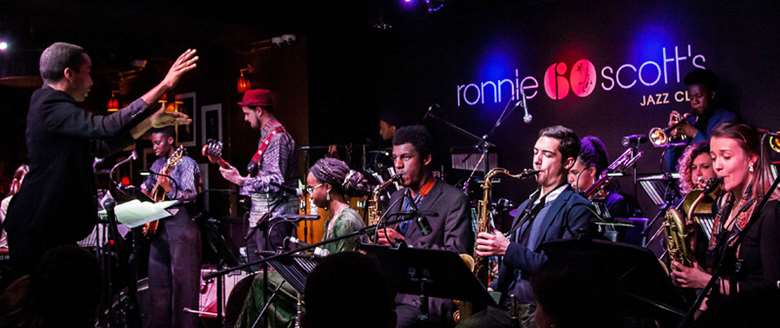NCO hit bullseye with CTI at Ronnie Scott's
Monday, February 4, 2019
Tomorrow’s Warriors’ role as a springboard for emerging talent in Britain has long co-existed with an inventive take on the history of jazz.

Tonight’s event is really a perfect illustration of as much. The support slot unveils a quartet of very impressive youngsters – pianist Sultan Stevenson, drummer Cassius Cobbson, bassist Menelik Claffey, alto-saxophonist Donovan Haffner – whose tender years belie their ability. Presenting original material that draws on the core vocabularies of swing and fusion they play a short but dynamic set, with a good balance between ensemble dynamics and solo improvisation, which bodes well for the production line of new musicians from the ever-expanding TW hothouse helmed by Gary Crosby and Janine Irons.
To a large extent the Nu Civilisation Orchestra is one of the most ambitious strands of its activity. The 14-piece unit duly upholds the legacy of the great big bands of which Duke Ellington’s remains a paragon, but it makes an astute foray into the world of 1970s electric fusion by celebrating the songbook of the feted CTI label. Crucially, the NCO has strings as well as horns and rhythm section to convincingly produce the all important sheen and silkiness that characterised the many scores written by Don Sebesky for George Benson, Randy Weston and Freddie Hubbard, among others.
Peter Edwards conducts engaging new arrangements, some courtesy of Ben Burrell. That said, the cohesion of the large amount of musicians on stage makes the venture come to life, as there is a clear understanding of the balance the original artists struck between funky accessibility and finely wrought artistry. Which means that, on one hand, there is a sensitive touch in the rendition of Weston’s quite gorgeous ‘Ifrane’ and, on the other, a crisp attack on Grover Washington’s ‘Mister Magic’ that is enhanced by a vocal from Cherise Adams-Burnet. Guitarist Shirley Tetteh, trombonist Rosie Turton, trumpeter Ife Ogunjobi and bassist Jay Darwish all provide excellent solos, but it is really the melodies and grooves, having made such an impact on the rare groove and hip-hop scenes, which stand tall. If the evening opened on a high with Deodato’s ‘2001’ it didn’t come down on the closer, Hubbard’s ‘Red Clay’. It was recorded in the 1970s, sampled in the 1990s and is still rocking in the millennium.
– Kevin Le Gendre
– Photo © Carl Hyde